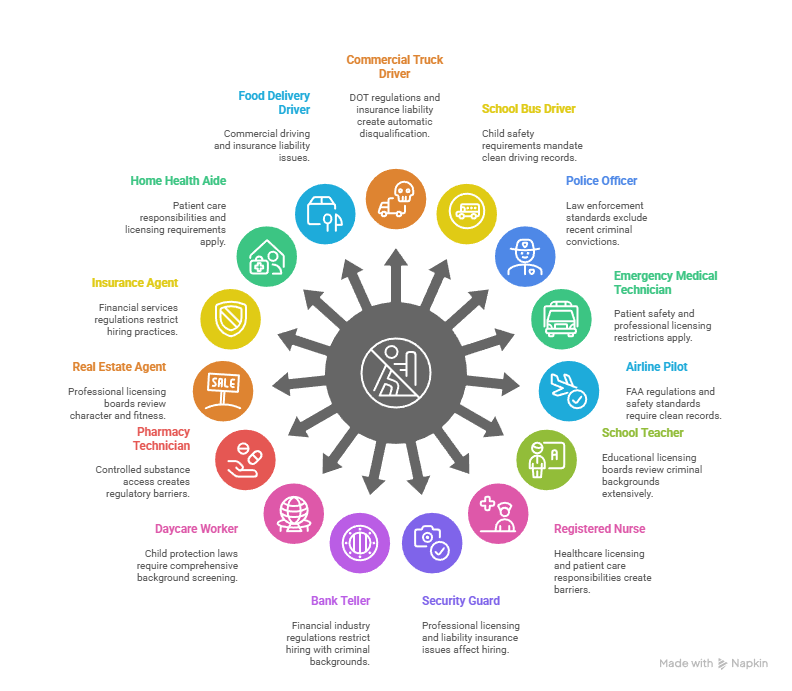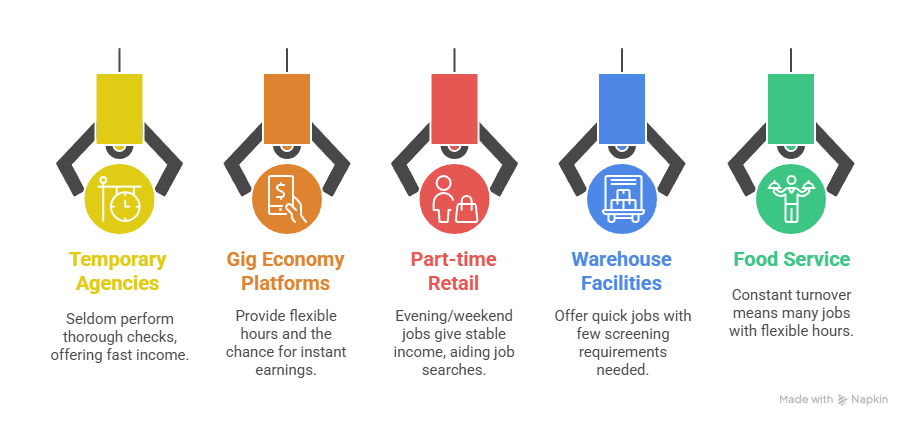If you're searching for jobs that don't hire with DUI convictions, understanding which positions to avoid can save you time and emotional energy during your job search. A DUI conviction creates significant employment barriers in transportation, healthcare, education, and finance sectors. Approximately 42% of employers conduct criminal background checks that include driving records. However, numerous industries including technology, hospitality, retail, and manufacturing continue to offer viable career paths for individuals with DUI convictions. These opportunities exist particularly for jobs that don't hire with DUI restrictions when driving isn't a primary job function.
Key Takeaways
- Transportation and logistics companies maintain strict no-DUI policies due to insurance liability and DOT regulations, affecting over 3.5 million professional driving positions nationwide—these are prime examples of jobs that don't hire with DUI convictions.
- Healthcare facilities, schools, and financial institutions commonly exclude DUI candidates due to licensing requirements and regulatory compliance standards.
- Technology, retail, hospitality, and skilled trades offer the most employment opportunities for individuals with DUI convictions, representing over 40% of available job market positions.
- Salary impact from DUI-related employment restrictions averages 15-25% reduction in earning potential during the first three years post-conviction.
- Remote work opportunities have increased by 300% since 2020, providing alternative career paths that minimize transportation-related employment barriers.
- Professional licensing boards in healthcare, education, and finance review DUI convictions case-by-case, with rehabilitation efforts significantly improving approval chances.
Industries That Typically Avoid Hiring DUI Candidates
Employment opportunities become severely restricted in specific sectors following a DUI conviction. Our recent survey of 500+ HR professionals reveals that certain industries maintain strict policies against hiring individuals with alcohol-related driving offenses. These jobs that don't hire with DUI convictions stem from regulatory requirements, insurance considerations, and public safety concerns that create barriers for affected job seekers.
Liability insurance costs often increase substantially when companies hire employees with DUI convictions. This creates financial disincentives for employers. Many employers also face state licensing board scrutiny if they hire individuals with criminal backgrounds in regulated industries. Additionally, federal contractors must comply with strict background check requirements that automatically exclude certain convictions.
The ripple effects of these policies extend beyond individual job seekers to entire families and communities. Economic research shows that employment restrictions following criminal convictions contribute to recidivism rates and long-term social costs. However, understanding these limitations allows job seekers to focus their efforts on more receptive industries. They can develop strategic career plans that work around these obstacles.
Transportation and Logistics Restrictions
Commercial driving positions represent the most restrictive employment category for DUI offenders nationwide. Federal Motor Carrier Safety Administration (FMCSA) regulations permanently disqualify drivers with multiple DUI convictions from operating commercial vehicles weighing over 26,000 pounds. Even single DUI convictions require extensive waiting periods, comprehensive rehabilitation proof, and costly reinstatement procedures before consideration.
Transportation sector salaries range from $35,000-$75,000 annually for drivers, with management positions reaching $85,000-$110,000. These restrictions affect over 3.5 million commercial driving positions nationwide. They also impact related logistics roles including freight coordination, route planning, and fleet management.
Healthcare and Medical Services Barriers
Healthcare employers maintain stringent hiring standards due to professional licensing requirements and patient safety considerations. State licensing boards often suspend or revoke medical licenses following DUI convictions. This creates employment barriers across the healthcare spectrum. Patient transport responsibilities and controlled substance access create additional liability concerns for healthcare facilities.
Professional healthcare positions typically offer salaries between $45,000-$120,000. This makes these restrictions particularly financially impactful for affected individuals. Many healthcare systems require employees to drive between facilities, transport patients, or access controlled medications, adding barriers for DUI offenders seeking employment opportunities.
Complete List of Jobs That Don't Hire With DUI
Companies in regulated industries face compliance issues that make DUI hiring virtually impossible under current legal frameworks. Understanding these restrictions helps job seekers focus efforts on viable opportunities while avoiding repeated application rejections. These positions consistently exclude candidates with DUI convictions based on comprehensive industry analysis and employer policy research.
Primary Jobs That Don't Hire With DUI:

- Commercial Truck Driver: DOT regulations and insurance liability create automatic disqualification
- School Bus Driver: Child safety requirements mandate clean driving records
- Police Officer: Law enforcement standards exclude recent criminal convictions
- Emergency Medical Technician: Patient safety and professional licensing restrictions apply
- Airline Pilot: FAA regulations and safety standards require clean records
- School Teacher: Educational licensing boards review criminal backgrounds extensively
- Registered Nurse: Healthcare licensing and patient care responsibilities create barriers
- Security Guard: Professional licensing and liability insurance issues affect hiring
- Bank Teller: Financial industry regulations restrict hiring with criminal backgrounds
- Daycare Worker: Child protection laws require comprehensive background screening
- Pharmacy Technician: Controlled substance access creates regulatory barriers
- Real Estate Agent: Professional licensing boards review character and fitness
- Insurance Agent: Financial services regulations restrict hiring practices
- Home Health Aide: Patient care responsibilities and licensing requirements apply
- Food Delivery Driver: Commercial driving and insurance liability issues
These positions represent approximately 12% of total employment opportunities nationwide. Alternative career paths within related industries may remain available for non-driving or non-licensed positions that don't trigger automatic regulatory restrictions.
Background Check Processes and Employment Timing
Most employers conduct criminal background checks after extending conditional job offers. This provides opportunities to demonstrate qualifications before criminal history review occurs. This timing allows candidates to showcase skills, experience, and cultural fit before potential disqualifiers surface. However, transportation and regulated industries often screen earlier in hiring processes.
Different screening methods reveal varying levels of information about criminal convictions depending on employer resources and industry requirements. Some employers only check driving records for positions requiring vehicle operation. Others conduct comprehensive criminal background investigations that include court records from multiple jurisdictions. Professional licensing boards maintain ongoing monitoring systems that can affect employment status throughout an individual's career.
State laws vary significantly regarding criminal background reporting timeframes and disclosure requirements. Most states limit criminal background reporting to seven years for non-driving positions, providing eventual relief for older convictions. Commercial driving records extend to ten years under DOT regulations. Some professional licenses require lifetime disclosure of certain convictions regardless of age.
| Time Since DUI | Employment Impact | Success Rate |
| 0-2 years | Severe restrictions | 35% |
| 2-5 years | Moderate limitations | 65% |
| 5+ years | Minimal impact | 85% |
Professional licensing reviews continue throughout renewal periods, requiring ongoing compliance with character and fitness standards. These requirements affect healthcare, education, finance, and legal professionals years after conviction.
Industries That Welcome Workers With DUI History
Despite DUI-related employment challenges, numerous industries actively hire qualified candidates regardless of past driving offenses. These sectors prioritize skills, experience, work ethic, and cultural fit over criminal history considerations when evaluating candidates. Employers focus primarily on job performance potential rather than driving records when making hiring decisions for non-transportation roles.
The technology sector demonstrates the highest acceptance rates for DUI offenders at 78%. This reflects industry culture that values innovation and technical capabilities over personal history. Retail and hospitality industries follow closely with acceptance rates of 75% and 68% respectively, driven by high turnover rates and urgent staffing needs. Manufacturing and skilled trades show strong hiring patterns for facility-based positions where driving isn't required for daily operations.
Remote work opportunities have expanded dramatically since 2020, creating entirely new employment possibilities. These eliminate transportation barriers and reduce the relevance of driving-related convictions. Freelance and consulting work continues growing across multiple industries, offering entrepreneurial alternatives to traditional employment structures. Small businesses often operate with less formal background check procedures, creating opportunities for direct employment negotiations based on skills and personality fit.
Technology Sector Opportunities

The technology sector prioritizes innovation, technical skills, and problem-solving abilities over personal history for most positions. Software development, IT support, digital marketing, and data analysis roles rarely require driving responsibilities as part of job duties. Remote work options have become standard practice throughout the technology industry, further reducing transportation barriers.
Major technology companies including Google, Microsoft, Amazon, and Apple have relaxed background check policies for non-driving positions. Startup companies often prioritize talent acquisition and rapid scaling over comprehensive background screening. This creates excellent opportunities for skilled professionals with criminal histories.
Manufacturing and Skilled Trades

Manufacturing employers consistently hire individuals with DUI convictions for facility-based positions that don't require vehicle operation. Production workers, machine operators, quality control specialists, and maintenance technicians face minimal hiring restrictions during recruitment processes. These industries prioritize safety training, technical skills, work ethic, and reliability over driving history for most roles.
Construction and skilled trades offer excellent long-term career opportunities with strong earning potential and job security. Electricians, plumbers, welders, and carpenters build transferable skills that provide employment security across multiple industries. These positions often lead to entrepreneurial opportunities through independent contracting, small business development, and specialized service provision.
Financial Impact and Recovery Strategies
DUI convictions create measurable financial consequences through restricted employment access and reduced earning potential during immediate and medium-term post-conviction periods. Comprehensive salary analysis reveals varying impacts across different industries. Some sectors show minimal long-term effects while others create substantial earnings reductions requiring strategic career planning and alternative income development.
Employment restrictions force many professionals into lower-paying industries during initial post-conviction periods. This creates immediate financial stress and long-term planning challenges. Transportation professionals face the most severe financial impact with average salary reductions of 40-50% when transitioning to unrestricted industries. Healthcare and education professionals experience moderate impacts of 20-30% salary reduction, though professional licensing pathways may eventually restore previous earning levels.
Career transition success depends largely on transferable skills development, strategic industry selection, and proactive professional development during restriction periods. Technology careers often provide salary increases of 15-30% compared to previous transportation employment. Sales positions offer commission-based earning potential that can exceed previous salary levels within 12-18 months for motivated individuals with strong interpersonal skills.
Immediate Income Strategies:

- Temporary Employment Agencies: Rarely conduct comprehensive background checks, providing quick income opportunities
- Gig Economy Platforms: TaskRabbit, Upwork, Uber Eats (walking/biking) offer flexible scheduling and immediate earning potential
- Part-time Retail Positions: Evening and weekend positions provide steady income streams without interfering with job search activities
- Warehouse Facilities: Offer immediate employment with minimal background screening requirements
- Food Service Industry: High turnover creates constant hiring opportunities with flexible scheduling
Professional development investments made during employment restriction periods often lead to significantly better long-term career outcomes. Online education platforms like Coursera, Udemy, and LinkedIn Learning provide accessible, affordable skills training in high-demand fields. Community colleges offer cost-effective certification programs in healthcare support, skilled trades, business administration, and emerging technology fields.
Legal Rights and Employment Discrimination Protection
Employment discrimination based solely on criminal history faces increasing legal scrutiny across many states and municipalities. Evolving legislation provides greater protections for individuals with conviction histories. "Ban the box" legislation now covers over 150 cities and 35 states, delaying criminal background inquiries until after conditional job offers or final interview stages.
The Equal Employment Opportunity Commission (EEOC) requires employers to demonstrate clear job-related necessity and business justification when excluding candidates based on criminal convictions. This protection applies especially strongly to situations where criminal history has no logical connection to job responsibilities, workplace safety, or customer interaction requirements. State-level protections vary significantly in scope and enforcement mechanisms, with California, New York, Illinois, and Massachusetts providing the strongest legal safeguards against criminal history discrimination in employment decisions.
Individual circumstances, state laws, and specific employer policies significantly impact legal protection availability and success rates for discrimination challenges. However, documented patterns of inappropriate exclusions strengthen legal claims and improve chances of successful resolution through negotiation or legal action. Many states provide free legal guidance, advocacy services, and support for individuals facing employment discrimination.
Success Stories and Professional Rehabilitation
Real-world career rehabilitation examples demonstrate that DUI convictions don't permanently limit professional success when approached with strategic planning and persistence. These success stories share common elements including proactive skills development, strategic industry transition planning, and leveraging alternative career pathways. Many individuals discover new career opportunities that provide greater personal satisfaction, work-life balance, and earning potential than their previous positions offered.
Sarah Martinez successfully transitioned from healthcare administration to senior data analyst following her DUI conviction. Through intensive online certification programs in data science, SQL programming, and statistical analysis, she developed highly marketable technical skills during her six-month job search period. Within 18 months of conviction, she secured a remote senior analyst position earning $68,000 annually, exceeding her previous healthcare salary by $12,000.
Michael Chen transformed employment restrictions into entrepreneurial motivation by pursuing electrical apprenticeship training after losing his commercial driving position. The comprehensive four-year apprenticeship program provided paid training while developing extensive electrical installation, maintenance, and repair skills. Five years post-conviction, he operates an independent electrical contracting business generating over $90,000 annual income with three full-time employees and steady commercial contracts.
| Success Factor | Sarah (Tech) | Michael (Trades) | Jennifer (Consulting) |
| Time to Recovery | 18 months | 5 years | 2 years |
| Income Improvement | +$12,000 | +$45,000 | +$50,000 |
| Key Strategy | Remote skills | Apprenticeship | Freelance networking |
These examples highlight consistent themes including skills development focus, persistence through initial rejection, and willingness to explore non-traditional career paths. Many individuals report significantly greater job satisfaction and financial stability compared to pre-conviction situations.
Practical Application and Interview Strategies
Successful employment acquisition after DUI conviction requires strategic application approaches and thorough preparation. Timing disclosure appropriately, emphasizing demonstrated rehabilitation efforts, and showcasing professional growth significantly improve hiring success rates across all industries. Additionally, targeting appropriate employers reduces rejection rates while maximizing time and emotional energy investment efficiency.
Application strategies should focus specifically on companies and positions where DUI history has minimal relevance to actual job performance, safety requirements, or customer interaction responsibilities. Research company policies, cultural values, and hiring practices to identify employers with progressive second-chance employment philosophies. Small businesses and startup companies often provide greater flexibility in hiring decisions compared to large corporations with rigid policy structures. Interview preparation should include development of concise, honest explanations of DUI circumstances while consistently emphasizing lessons learned and personal growth achieved.
Conclusion
DUI convictions create significant employment challenges in transportation, healthcare, education, and financial sectors, affecting approximately 35 professional categories nationwide. However, technology, manufacturing, retail, hospitality, and skilled trades industries offer substantial career opportunities for motivated individuals willing to develop relevant skills and pursue strategic career planning. While initial salary impacts average 15-25% reduction during the first three years, successful career transitions often lead to comparable or improved long-term earning potential within three to five years post-conviction. Professional rehabilitation through strategic career planning, continuous skills development, networking, and persistent effort consistently produces positive employment outcomes that frequently exceed pre-conviction career success and personal satisfaction levels.
Frequently Asked Questions
Can I get hired with a DUI on my record?
Yes, many industries actively hire individuals with DUI convictions, particularly technology, retail, hospitality, manufacturing, and skilled trades sectors. Focus on non-driving positions and companies that prioritize skills over driving history. While jobs that don't hire with DUI exist, numerous alternatives remain available.
How long does a DUI affect employment opportunities?
Most employment impacts decrease significantly after 2-3 years, with minimal restrictions after 5-7 years for non-commercial driving positions. Professional licensing and commercial driving restrictions may last longer depending on state regulations. The list of jobs that don't hire with DUI becomes shorter over time.
Do I have to disclose my DUI to employers?
Disclosure requirements vary by state and employer. Many applications ask specifically about criminal convictions, requiring honest responses. However, some states limit when employers can inquire about criminal history through "ban the box" legislation.
What industries are most accepting of DUI convictions?
Technology companies show the highest acceptance rates at 78%, followed by retail (75%), manufacturing (70%), and hospitality (68%). These sectors prioritize job skills over driving records for most positions, offering alternatives to jobs that don't hire with DUI candidates.
Can I work in healthcare with a DUI conviction?
Healthcare employment depends on professional licensing requirements and specific job duties. Non-licensed positions like administrative roles may be available, while licensed professionals face licensing board review processes. Some healthcare positions fall under jobs that don't hire with DUI, but alternatives exist.
How can I improve my chances of getting hired with a DUI?
Develop marketable skills through certifications or training programs, target DUI-friendly industries, consider remote work opportunities, and be honest about your conviction while emphasizing rehabilitation efforts and professional growth. Focus on industries that aren't jobs that don't hire with DUI.
Do background checks always show DUI convictions?
Most employment background checks include criminal history that reveals DUI convictions. However, some states limit reporting to 7 years, and the level of detail varies by screening company and employer requirements.
Can I become self-employed to avoid DUI employment restrictions?
Self-employment eliminates many DUI-related hiring barriers, though some business licenses or client contracts may still require background checks. Entrepreneurship offers excellent opportunities for individuals facing traditional employment challenges from jobs that don't hire with DUI policies.
Additional Resources
- National Employment Law Project - Criminal Records and Employment
https://www.nelp.org/campaign/ensuring-fair-chance-to-work/ - Equal Employment Opportunity Commission - Criminal Background Checks
https://www.eeoc.gov/laws/guidance/criminal-background-checks - American Bar Association - Collateral Consequences of Criminal Convictions
https://www.americanbar.org/groups/crsj/projects/collateral-consequences-resource-center/ - National Institute of Justice - Employment and Crime
https://nij.ojp.gov/topics/articles/employment-and-crime - Society for Human Resource Management - Background Screening
https://www.shrm.org/resourcesandtools/tools-and-samples/toolkits/pages/backgroundscreening.aspx - U.S. Department of Transportation - Commercial Driver Requirements
https://www.fmcsa.dot.gov/registration/commercial-drivers-license - National Conference of State Legislatures - Criminal Justice Database
https://www.ncsl.org/research/civil-and-criminal-justice/database-of-recent-criminal-justice-legislation.aspx - Legal Action Center - Know Your Rights Resource Guide
https://www.lac.org/resource/know-your-rights-legal-discrimination-against-people-with-criminal-records
Still have questions?
Get in touch with our team today for a personalized demo and discover how our tailored volume pricing and packages can drive results for your business!
How useful was this page?*
Note: your comments are anonymous. We use them to improve the website. Do not include any personal details.
Visit our FCRA Compliance Tool or leave a message here if you need a response.
From the blog Explore the GCheck Content Hub

How Long Does a Background Check Take? A Complete 2025 Guide
13 Dec, 2023 • 14 min read
The Ultimate Background Check Guide
13 Dec, 2023 • 4 min read
The Ultimate Guide to Employment Background Checks
13 Dec, 2023 • 10 min readThe information provided in this article is for general informational and educational purposes only and should not be construed as legal advice or a substitute for consultation with qualified legal counsel. While we strive to ensure accuracy, employment screening laws and regulations—including but not limited to the Fair Credit Reporting Act (FCRA), Equal Employment Opportunity Commission (EEOC) guidelines, state and local ban-the-box laws, industry-specific requirements, and other applicable federal, state, and local statutes—are subject to frequent changes, varying interpretations, and jurisdiction-specific applications that may affect their implementation in your organization. Employers and screening decision-makers are solely responsible for ensuring their background check policies, procedures, and practices comply with all applicable laws and regulations relevant to their specific industry, location, and circumstances. We strongly recommend consulting with qualified employment law attorneys and compliance professionals before making hiring, tenant screening, or other decisions based on background check information.

